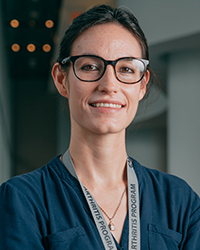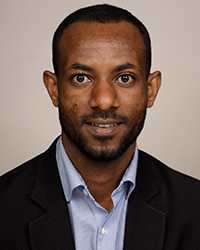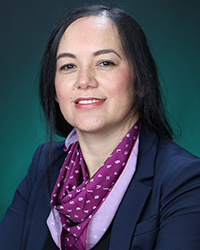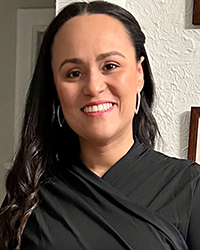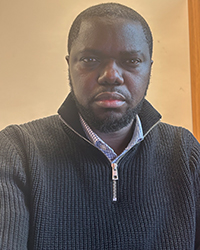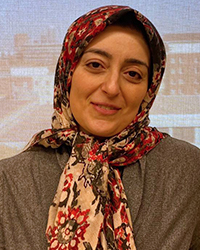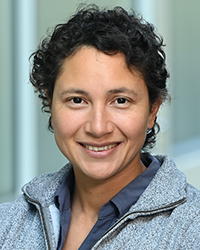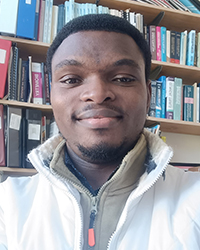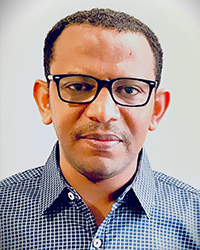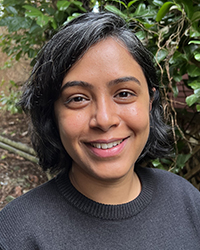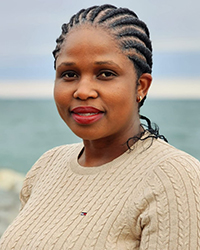Developing and evaluating a facilitation intervention to support ActionADE’s scale up in diverse health settings
Name: Dr. Yuen Yan Lau
Institution: Vancouver Coastal Health Research Institute
Award funder: CIHR Institute of Aging (IA)
Funding Pool: Aging Person in an Aging Society
About this research:
My project seeks to enhance the use of digital health innovations in healthcare. I will co-create and test a support system to spread a web-based medication safety intervention (ActionADE) in long-term care homes, community clinics, and in-patient wards. I aim to find the best ways to promote its use in various places, preventing unexpected problems with medicines for anyone.
Email: erica.lau@ubc.ca
|
Towards the discovery of predictive biomarkers for outcomes in lupus nephritis
Name: Dr. Laura Whittall-Garcia
Phase 1 Institution: University Health Network
Phase 2 Institution: University of Toronto
Award funders: CIHR Institute of Musculoskeletal Health and Arthritis (IMHA), Arthritis Society Canada
Funding Pool: Arthritis
About this research:
The aim of my study is to measure the levels of Interferon-induced proteins in the kidneys at the time of a kidney flare in patients with Lupus Nephritis and to determine whether the levels of these molecules can be used to predict the response to treatment. The proposed study has the potential to improve kidney outcomes by identifying patients with a high probability of a poor prognosis, allowing initiation of more aggressive therapy.
Email: laura.whittallgarcia2@uhn.ca
X: @LauraWhittall
|
Oxytocinergic regulation of bi-directional social contagion and social buffering during stress recall
Name: Dr. Ibukun Akinrinade
Institution: Hotchkiss Brain Institute (University of Calgary)
Award funders: CIHR, Azrieli Foundation
Funding Pool: Brain Health and Cognitive
About this research:
Recalling stressful events can trigger responses akin to the original experience, potentially impacting mental health. While social presence during stress recall is suggested as a therapeutic approach, its mechanisms remain unclear. This project will explore how oxytocin, a social-influencing neuropeptide, regulates the recall of stressful events within social contexts to enhance our understanding of its role in mental health treatment.
Email: ibukun.akinrinade@ucalgary.ca
LinkedIn: Dr. Ibukun Akinrinade
Web: Dr. Ibukun Akinrinade
|
Brain-mind-environment: Harnessing complexity to address brain health inequity
Name: Dr. Andrea Jones
Institution: University of British Columbia
Award funders: IA, Azrieli Foundation
Funding Pool: Brain Health and Cognitive
About this research:
As a neurology physician-scientist trainee, I apply epidemiological and complexity science approaches to address disparities in brain health. My research examines the complex interplay between social determinants and clinical factors across the lifespan that influence cognition, function, and brain structure for individuals after stroke. My goal is to develop and implement high-yield interventions to improve brain health for marginalized populations.
Email: aajones@student.ubc.ca
X: @aajonesy
LinkedIn: Dr. Andrea Jones
Web: Dr. Andrea Jones
|
Dementia risk mitigation in individuals with cardiovascular disease
Name: Dr. Myuri Ruthirakuhan
Institution: Sunnybrook Research Institute
Award funders: CIHR, IA, Bright Focus Foundation
Funding Pool: Brain Health and Cognitive
About this research:
With the aging population, dementia is a growing concern, especially as traditional dementia medications have limited benefits. My research will focus on improving cognition and reducing dementia-risk in those with cardiovascular conditions. The goal is to translate my findings clinically, where we will identify individuals at the highest risk of dementia and initiate personalized treatments to reduce that risk.
Email: myuri.ruthirakuhan@sunnybrook.ca
X: @MRuthirakuhan
LinkedIn: Dr. Myuri Ruthirakuhan
|
Cardiovascular disease, multimorbidity and occupational engagement
Name: Dr. Victrine W Tseung
Institution: McMaster University
Award funders: Alzheimer Society of Canada, Azrieli Foundation
Funding Pool: Brain Health and Cognitive
About this research:
My research aims to 1) develop conceptual frameworks for occupational engagement of individuals with cardiovascular disease and multimorbidity and their caregivers and 2) implement prediction tools for self-care and quality of life. The conceptual frameworks and prediction tools can enable clinicians to develop risk profiles and early intervention approaches for individuals with cardiovascular disease and multimorbidity.
Email: tseungv@mcmaster.ca
X: @victrine_t
|
The influence of ethical and social values on decision-making about participation in personalized breast cancer screening: A constructivist grounded theory study of South Asian people in Canada
Name: Dr. Manisha Pahwa
Institution: McGill University
Award funders: CIHR Institute of Cancer Research (ICR)
Funding Pool: Cancer
About this research:
South Asian communities in Canada have diverse values and rich lived experiences that can inform policies to remedy breast cancer inequities impacting these groups. With the engagement of South Asian communities, together we are co-creating an understanding of values, lived experiences, and ethical issues in personalized breast cancer screening, and developing policy recommendations for how screening can be fair and effective for South Asian communities.
Email: manisha.pahwa@mcgill.ca
|
Interrogating the role of chromatin remodelling proteins in vision health and development using mouse models of neurological system diseases to devise novel therapeutic approaches for visual impairment
Name: Dr. Pamela S Lagali
Institution: Ottawa Hospital Research Institute
Award funders: CIHR Institute of Genetics (IG), CIHR Institute of Infection and Immunity (III), Fighting Blindness Canada
Funding Pool: Eye Disease
About this research:
Retinal degenerative diseases cause debilitating and incurable vision loss that inevitably leads to complete blindness, and they are increasingly prevalent in our aging population. My research incorporates the use of mouse models of retinal degeneration to study the biological mechanisms underlying retinal pathology, which in turn may suggest new ways of preventing or reversing disease processes and promoting visual health.
Email: plagali@ohri.ca
|
Integrated care approach for the management of chronic musculoskeletal pain in a Canadian health system
Name: Dr. Mulugeta Bayisa Chala
Institution: London Health Sciences Centre Res. Inc.
Award funders: CIHR
Funding Pool: General
About this research:
The overarching aim my CHIR REDI project is to develop an integrated model of care for people with chronic musculoskeletal pain in Canada. My research will address the healthcare needs of people with the condition through exploring the current state of integrated care in our system through literature reviews and interviews, co-designing, implementing, and evaluating the newly developed model of care by engaging relevant stakeholders.
Email: MulugetaBayisa.Chala@sjhc.london.on.ca
X: @Mulugeta_PT
LinkedIn: Dr. Mulugeta Bayisa Chala
|
Rational design of more potent lipid nanoparticle mRNA therapeutics
Name: Dr. Miffy Hok Yan Cheng
Phase 1 & 2 Institution: University of British Columbia
Award funders: CIHR
Funding Pool: General
About this research:
Gene therapy presents innovative treatments for many diseases by modifying biological activities or repairing defective genes. Central to this technology is the delivery of nucleic acids, yet biological barriers persist that hinder gene delivery. My research focuses on the rational design of new gene carriers such as lipid nanoparticles to address the safety and efficacy concerns associated with these systems.
Email: miffy.cheng@ubc.ca
LinkedIn: Dr. Miffy Hok Yan Cheng
|
Identifying mechanisms and biomarkers of perinatal depression for improving treatment and risk prediction: A translational approach
Name: Dr. Rand Eid
Institution: McGill University
Award funders: CIHR
Funding Pool: General
About this research:
Perinatal depression is common but remains severely understudied, underdiagnosed, and undertreated. As a translational neuroscientist, my research seeks to better understand the underlying brain biology of perinatal depression, and to develop new methods for better predicting perinatal depression risk and treatment response. This research holds promise for tangible improvements in health outcomes for both parents and children.
Email: rand.eid@mcgill.ca
|
Type 2 Diabetes Prevention Van: A vehicle for mobilizing health promotion for newcomers living in Calgary and Hamilton
Name: Dr. Sujane Kandasamy
Phase 1 Institution: Brock University
Phase 2 Institution: McMaster University
Award funders: III
Funding Pool: General
About this research:
Canada is welcoming an unprecedented number of immigrants--over 1.5 million people--over the next 5 years, including those who will arrive for economic, family, and climate-related reasons. While it is well established that type 2 diabetes is inextricably linked with socioeconomic status and the social determinants of health, there has been less of a focus on the effects of immigration and migration as factors in the prevalence and prevention of type 2 diabetes in newcomers. My research builds on existing evidence focused on providing culturally-responsive and equity-based programs and services with and for ethnocultural populations. By addressing relevant social determinants of health, we will co-design and co-evaluate a mobile type 2 diabetes screening/management service (delivered using a “health van”) alongside beneficiaries, partner organizations, academics, and healthcare professionals.
Email: skandasamy@brocku.ca
LinkedIn: Dr. Sujane Kandasamy
|
Re-orienting the food and nutrition surveillance system in Canada: a focus on impacts at the intersection of health, climate, and equity
Name: Dr. Kirsten M Lee
Institution: York University
Award funders: CIHR
Funding Pool: General
About this research:
I will collaborate with the Government of Canada to strengthen the ability of Canadian surveillance systems to monitor the impact of the food system on health, climate, and equity. My research focuses on improving governance structures and surveillance data to promote coordination across sectors, which is critical for informing policy and programming decisions for human and planetary health.
Email: leekm@yorku.ca
X: @kirsten_m_lee
LinkedIn: Dr. Kirsten M Lee
|
Co-building a community-based, culturally sensitive, and family-focused program to enhance the positive mental well-being of newcomer families in the Peel Region
Name: Dr. Cilia Mejia-Lancheros
Institution: Trillium Health Partners
Award funders: III
Funding Pool: General
About this research:
Newcomers and refugees from diverse backgrounds settling in Peel Region (Ontario, Canada) have varying life experiences that intersect with social and health barriers they face, adversely impacting their mental health. Alongside community organizations, newcomers, and researchers, I will co-design, co-implement and co-evaluate a community-based, culturally sensitive, and family-focused program that enhances the positive mental well-being of newcomers’ families in Peel.
Email: Cilia.Mejia-Lancheros@thp.ca
|
Sedatives pharmacology in acute respiratory distress syndrome - SPA
Name: Dr. Diana Morales Castro
Institution: University Health Network
Award funders: III
Funding Pool: General
About this research:
Acute Respiratory Distress Syndrome (ARDS) is a condition causing severe lung inflammation and respiratory failure, affecting over 3 million people annually. Sedation is vital for ARDS patients to manage pain and anxiety, improve comfort, and tolerate treatments. This project aims to create pharmacological models for common sedatives in ARDS, designing safe sedation protocols while minimizing adverse effects.
Email: diana.moralescastro@uhn.ca |
Investigating the role of drug tolerant persisters in driving colorectal cancer metastasis
Name: Dr. Sumaiyah Rehman
Institution: University Health Network
Award funders: CIHR Institute of Gender and Health (IGH), III
Funding Pool: General
About this research:
Colorectal cancer (CRC) is the 3rd leading cause of cancer-related mortality in North America, largely driven by metastatic relapse. Using our patient-derived CRC models, we identified a drug tolerant persister (DTP) tumor cell population that is responsible for relapse. Now, my research aims to elucidate DTPs’ role in mediating metastases, identifying diagnostic and prognostic indicators for metastases-prone patients, and guiding therapeutic strategies.
Email: skrehman26@gmail.com
|
Enhancing service accessibility and the health of underserved families raising a child with a neurodevelopmental disability (NDD)
Name: Dr. Miriam Gonzalez
Institution: University of Manitoba
Award funders: III, Azrieli Foundation
Funding Pool: Health Systems
About this research:
My study aims to attain an in-depth understanding of ethnic minority (racialized) parents and/or caregivers’ experience of accessing services for their child with a neurodevelopmental disability. The information obtained from this study will help inform solutions for enhancing service access.
Email: miriam.gonzalez@umanitoba.ca
X: @DrMiriamG
|
Addressing burnout in women physicians with intersectional identities: a narrative inquiry and life story approach
Name: Dr. Rabia Khan
Phase 1 & 2 Institution: University of British Columbia
Award funders: CIHR Institute of Health Services and Policy Research (IHSPR)
Funding Pool: Health Systems
About this research:
I will conduct a study of women physicians, using a narrative inquiry approach. I will examine participants’ career journey through medicine and their experience with burnout and professional fulfillment. These results will inform training curricula, health policies, and practices to support the health workforce. I aim to address health equity and burnout, to ensure health for all.
Email: rabia.khan@ubc.ca
X: @therealmeded
Web: Rabia Khan
|
Epigenetic and molecular regulation of aging and age-related comorbidities
Name: Dr. Ana Hernandez Cordero
Institution: University of British Columbia
Award funders: CIHR HIV/AIDS STBBI Research Initiative
Funding Pool:
HIV/AIDS and STBBI
About this research:
The current focus of my research is on epigenetic aging, a marker of biological age, and its relationship with Chronic Obstructive Pulmonary Disease in People Living with the Human Immunodeficiency Virus. My future research interests are in investigating the epigenetic and molecular regulation of aging and the impact of aging on the development and progression of complex chronic diseases.
Email: Ana.Hernandez@hli.ubc.ca
|
Systematically assessing the cancer-modulating capabilities of viral and bacterial genes for potential therapeutic strategies
Name: Dr. Yeojin Lee
Institution: Sinai Health System
Award funders: CIHR HIV/AIDS STBBI Research Initiative
Funding Pool:
HIV/AIDS and STBBI
About this research:
One out of every five human cancers worldwide are caused by pathogens. In this study, I will introduce a collection of more than 5,000 genes from over 200 pathogens in mice and systematically delineate their role in tumorigenesis. I will further explore the underlying molecular mechanisms that can be harnessed for developing novel cancer treatments.
Email: yeolee@lunenfeld.ca
|
EMPOWHPVR: Exploring the factors that impact HPV-self sampling uptake amongst Black women and people with a cervix in Peel region, Ontario
Name: Dr. Nakia Lee-Foon
Institution: Trillium Health Partners
Award funder: CIHR HIV/AIDS STBBI Research Initiative
Funding Pool:
HIV/AIDS and STBBI
About this research:
HPV infection is the most common cause of cervical cancer, the third most diagnosed cancer amongst women and people with a cervix (WPC) in Ontario. My study aims to create an HPV self-sampling program for and informed by a population often under screened for this cancer—Black WPC. Findings may inform cancer screening initiatives, awareness and increase screening rates.
Email: Nakia.lee-foon@thp.ca
LinkedIn: Dr. Nakia Lee-Foon
|
Development and implementation of peer-facilitated decision-making and referral support to increase uptake and adherence to HIV pre-exposure prophylaxis in African Caribbean and Black communities in Ontario
Name: Dr. Wale T Ajiboye
Institution: Unity Health Toronto
Award funders: CIHR HIV/AIDS STBBI Research Initiative
Funding Pool:
HIV/AIDS and STBBI
About this research:
I am a Clinical Pharmacist and an Implementation Scientist. This study will develop and implement a theory-driven, culturally appropriate, and community-led intervention to increase the acceptance, uptake and use of HIV PrEP among eligible Black Canadians. The goal of the project is to decrease the incidence of HIV infection in Black communities in Canada.
Email: wale.ajiboye@unityhealth.to
|
Investigating the topology of viral surfaces to inform improved therapeutics & vaccines
Name: Dr. Jonathan D Burnie
Institution: Harvard University
Award funders: CIHR HIV/AIDS STBBI Research Initiative
Funding Pool: HIV/AIDS and STBBI
About this research:
Endemic coronaviruses cause up to 30% of annual colds but remain understudied. My research will explore how proteins on the surface of the endemic coronaviruses impact the initial stages of infection, particularly focusing on interactions with cellular receptors. The overarching goal of this work is to better understand the fundamental biology of coronaviruses to inform efficacious vaccines and therapeutics.
Email: jonathan_burnie@hsph.harvard.edu
|
Understanding the Impact of drug use on the microbiome and sexually transmitted and blood-borne infections
Name: Dr. Mariana D Herrera Diaz
Institution: University of Manitoba
Award funders: CIHR HIV/AIDS STBBI Research Initiative
Funding Pool: HIV/AIDS and STBBI
About this research:
Drug use affects the microbiome, and changes in the microbiome affect the risk of new Sexually Transmitted and Blood-Borne infections (STBBI). My research will evaluate the effect of drug use on HIV treatment outcomes, the microbiome, and if changes in the microbiome are related to the new STBBI. These results will help health providers and researchers to design strategies to improve HIV treatment adherence and decrease the new STBBI.
Email: mariana.herreradiaz@umanitoba.ca
LinkedIn: Dr. Mariana D Herrera Diaz
|
Non-vaccine high-risk human papillomavirus genital infection, a neglected threat in underscreened immigrant and refugee women from Sub-Saharan Africa living in Canada
Name: Dr. Ralph-Sydney Mboumba Bouassa
Institution : Institut du Savoir Montfort
Award funder: CIHR HIV/AIDS STBBI Research Initiative
Funding Pool: HIV/AIDS and STBBI
About this research:
Cervical cancer disproportionately affects African immigrant women in Canada. Cervical cancer is caused by the human papillomavirus (HPV) infection and can be prevented through HPV vaccination. However, some HPV types that are frequent in African women are not covered by the HPV vaccine. Thus, we aim these HPV types in African immigrant women living in Canada.
Email: mboumba_bouassa.ralph-sydney@courrier.uqam.ca
LinkedIn: Dr. Ralph-Sydney Mboumba Bouassa
|
Tackling antimicrobial resistance with genomics and bioinformatics
Name: Dr. Idowu B Olawoye
Institution: University of Western Ontario
Award funder: CIHR HIV/AIDS STBBI Research Initiative
Funding Pool: HIV/AIDS and STBBI
About this research:
As a microbiologist, I will be developing rapid diagnostics and identifying antimicrobial resistance genetic markers in the highly resistant Mycoplasma genitalium, which is a sexually transmitted infection responsible for nongonococcal urethritis commonly affecting minority groups. By developing new methods to analyze M. genitalium directly from clinical specimens, we will be able to achieve equitable healthcare for marginalized people.
Email: idowuolawoye@gmail.com
X: @idowuolawoye
LinkedIn: Dr. Idowu B Olawoye
|
Understanding how motors drive the pathogenesis in host cells infected with Chlamydia trachomatis
Name: Dr. Safia Omer
Institution: Hospital for Sick Children (SickKids)
Award funder: CIHR HIV/AIDS STBBI Research Initiative
Funding Pool: HIV/AIDS and STBBI
About this research:
Chlamydia, the leading bacterial STI in Canada, is associated with pelvic inflammatory disease and the risk of cervical cancer. Chlamydia ingeniously hijacks natural cellular processes that drive Chlamydia vacuole to the cell center, establishing chronic infection. Using techniques to screen protein interactions, in vitro reconstitution assays, and fluorescence imaging I aim to identify and reconstruct the molecular motor machinery exploited to position the Chlamydia in cells.
Email: safia.omer@utoronto.ca
|
Understanding the mechanism of protective immunity against HIV-infection
Name: Dr. Shima Shahbaz
Institution: University of Alberta
Award funder: CIHR HIV/AIDS STBBI Research Initiative
Funding Pool: HIV/AIDS and STBBI
About this research:
Despite available antiretroviral treatment, HIV persists as a global health concern. Natural control of HIV infection is rare but does occur. My project explores natural HIV immunity mechanisms. The goal of my research proposal is to uncover the genetic and molecular factors underlying natural immunity, potentially providing valuable clinical insights for the treatment of HIV and other related conditions.
Email: sshahbaz@ualberta.ca
|
Phase 1: Metabolite biomarkers of future diabetes in South Asian women diagnosed with gestational diabetes Phase 2: Metabolite profiling of cardiometabolic risk factors in women and children in multiethnic Canadian and global birth cohorts
Name: Dr. Sandi Azab
Phase 1 & 2 Institution: McMaster University
Award funders: CIHR Institute of Human Development, Child and Youth Health (IHDCYH), III
Funding Pool: Human Development, Child and Youth Health
About this research:
My research revolves around early origins of cardiometabolic disease, primordial prevention, and biomarker discovery. Using state-of-the-art metabolomics, we will identify molecules in a mother’s blood that predict her risk of diabetes and her child’s risk of obesity and metabolic syndrome. Our research will inform risk assessment and screening, improving health of all Canadians especially populations with highest disease burdens.
Email: azabs@mcmaster.ca
X: @sandi_azab
LinkedIn: Dr. Sandi Azab
Web: Dr. Sandi Azab
|
Fuel for Survival: metabolic interventions to prevent neonatal sepsis
Name: Dr. Nelly A Amenyogbe
Phase 1 & 2 Institution: Dalhousie University
Award funder: III
Funding Pool: Infectious Disease and Immune System
About this research:
Newborn sepsis is a leading cause of childhood death, and vaccines targeting specific infections do not work fast enough to prevent it. Our previous work found out how the tuberculosis vaccine, BCG can quickly boost immunity and decrease risk for death. BCG may work better if it were coupled with the right nutrition to fuel this immune response. This proposal will identify ways to improve on BCG by coupling it with metabolic fuel necessary for newborns to fight sepsis.
Email: nelly.amenyogbe@dal.ca
X: @nelly-amenyogbe
LinkedIn: Dr. Nelly A Amenyogbe
|
Investigating the role of intestinal microbiota in intestinal macrophage immune memory
Name: Dr. Aline Ignacio Silvestre da Silva
Institution: University of Calgary
Award funder: III
Funding Pool: Infectious Disease and Immune System
About this research:
My REDI project aims to determine whether the intestinal microbiota can induce immunological memory in innate cells. This research will elucidate the mechanisms involved in the induction of innate memory, which is critical for the design of new therapies and vaccines. Additionally, this study will allow us to better harness the power of the intestinal microbiota to boost immune responses to infections or cancer and limit inflammatory diseases.
Email: aline.silva@ucalgary.ca
X: @alineignaciom
|
Unraveling the role of extracellular matrix dysregulation in age-related fibrotic and inflammatory pulmonary disease
Name: Dr. FuiBoon Kai
Phase 1 & 2 Institution: University of Calgary
Award funder: III
Funding Pool: Infectious Disease and Immune System
About this research:
Idiopathic pulmonary fibrosis (IPF) is a fatal disease where the lung extracellular matrix (ECM) becomes progressively stiffer. Although ECM-stiffening is thought to be a consequence of tissue injury, evidence supports that the ECM also affects cell fate and function. My research investigates the crosstalk between ECM and lung cells to identify novel mechanisms that may be targeted to treat IPF.
Email: fuiboon.kai@ucalgary.ca
|
Elucidating the intricate interplay between mitochondria, innate immunity, and viral pathogenesis in heart failure
Name: Dr. Yasir Mohamud
Institution: University of British Columbia
Award funders: IHDCYH, III
Funding Pool: Infectious Disease and Immune System
About this research:
My research targets the underappreciated role of mitochondrial dysfunction in viral heart disease. We'll explore how viruses use mitochondria to increase inflammation and conduct three studies: examining mitochondrial damage, its role in inflammation, and identifying genetic risk factors. This novel approach aims to develop effective treatments for viral heart disease, addressing a significant gap in current medical strategies.
Email: Yasir.Mohamud@hli.ubc.ca
LinkedIn: Dr. Yasir Mohamud
|
Expanding the use of SGLT-2 inhibitor to improve cardiorenal disease
Name: Dr. Ayodele Odutayo
Phase 1 Institution: Women's College Hospital
Phase 2 Institution: Sunnybrook Hospital
Award funders: CIHR Institute of Nutrition, Metabolism and Diabetes (INMD), III, Kidney Foundation of Canada
Funding pool: Kidney Health
About this research:
Sodium glucose co-transporter 2 inhibitors (SGLT2i) reduce the risk of heart failure and worsening kidney function. However, SGLT2i are only approved for people with diabetes, advanced kidney disease or heart failure. My research will examine the use of SGLT2 inhibitors in new populations such as people without diabetes but who at risk for heart failure and kidney disease.
Email: ayodele.odutayo@mail.utoronto.ca
|
Innovative approaches to reduce the burden of unmet health care needs in aging Canadians with musculoskeletal conditions: A comprehensive investigation to improve health services and health equity
Name: Dr. Jessica Wong
Phase 1 Institution: University of Ontario Institute of Technology
Phase 2 Institution: Western University
Award funder: IMHA
Funding pool: Musculoskeletal Health
About this research:
My research focuses on unmet healthcare needs in older Canadians with musculoskeletal conditions. My research will help us understand who will develop unmet needs among older adults, and their characteristics and experiences. I lead a team that includes patients, caregivers, and community partners to co-create knowledge. We are developing innovative strategies to improve health and access-to-care for diverse older Canadians.
Email: jessica.wong@ontariotechu.ca
LinkedIn: Dr. Jessica Wong
|
Emerging Infectious Diseases and Health Emergencies: Estimating the prevalence of the bacteria pneumonia and COVID-19 diseases, and quantifying COVID-19 impacts on vulnerable population such as opioid overdose for effective monitoring and planning
Name: Dr. Kehinde Olobatuyi
Institution: University of Victoria
Award funder: CIHR Centre for Research on Pandemic Preparedness and Health Emergencies (CRPPHE)
Funding pool: Pandemic Preparedness and Health Emergencies
About this research:
Emerging infectious diseases globally cause significant impact, leading to unexpected illnesses, deaths, and disruptions in travel, business, and daily life. Despite preparedness tools, each new disease presents unique challenges, necessitating constant adaptation. I aim to assist the Canadian government to accurately quantify infectious disease prevalence, predict new SARS-CoV-2 variants, and assess impacts on vulnerable populations for more effective future planning.
Email: olobatuyikenny@uvic.ca
LinkedIn: Dr. Kehinde Olobatuyi
|
Repurposing Histamine Receptor 1 (HR1) blockers for host directed therapy of tuberculosis
Name: Dr. Henok A Sahile
Institution: University of British Columbia
Award funder: CRPPHE
Funding pool: Pandemic Preparedness and Health Emergencies
About this research:
Tuberculosis (TB), caused by Mycobacterium tuberculosis, is the leading cause of death by an infectious disease. Lengthy treatment regimens and rapid emergence of drug resistance bacteria are the major challenges to effectively manage the disease. My research focusses on the development of new anti TB drugs that potentially shorten treatment duration and are more effective against multidrug resistance bacteria.
Email: henok.sahile@ubc.ca
LinkedIn: Dr. Henok A Sahile
|
Alternative NF-kB signaling in muscle regeneration and muscular dystrophy
Name: Dr. Neena Lala-Tabbert
Institution: Children's Hospital of Eastern Ontario Research Institute Inc
Award funders: CIHR Institute of Genetics (IG), Azreili Foundation
Funding pool: Rare Diseases
About this research:
My research will explore the role of alternative NF-kB signaling during muscle regeneration and in the pathogenesis of Duchenne Muscular Dystrophy (DMD). This work aims to increase our understanding of the relevant processes occurring in dystrophic muscle and will allow for a more informed approach to treat DMD.
Email: neenalala@gmail.com
LinkedIn: Dr. Neena Lala-Tabbert
|
Using advanced genomic and computational approaches to discover and characterize novel genetic variants in neurodevelopmental disorders
Name: Dr. Indhu Shree Rajan Babu
Institution: University of British Columbia
Award funder: IG
Funding pool: Rare Diseases
About this research:
My research aims to uncover the genetic causes of neurodevelopmental disorders (NDDs) using cutting-edge genomic sequencing technologies and computational tools. My work seeks to identify NDD-causing mutations that cannot be detected using standard-clinical tests, and thereby, enhance our understanding of NDDs, pave the way for innovative treatments, and demonstrate the significance of integrating advanced genetic tests into routine diagnostic assessments.
Email: indhu.babu@bcchr.ca
LinkedIn: Dr. Indhu Shree Rajan Babu
|
Towards focused ultrasound aided liquid biopsy of premalignant/malignant peripheral nerve sheath tumours
Name: Dr. Ying Meng
Phase 1 Institution: University Health Network
Phase 2 Institution: Sunnybrook Research Institute
Award funder: CIHR, IG
Funding pool: Rare Diseases
About this research:
My research aims to innovate non-invasive treatments for neurological diseases using focused ultrasound. One approach I have shown is the non-invasive disruption of the blood-brain barrier to improve drug delivery and biomarker shedding from the brain. This project explores focused ultrasound blood-nerve barrier modulation in order to deliver precision care for peripheral nerve sheath tumors in neurofibromatosis type 1.
Email: ying.meng@utoronto.ca
|
Translational and post-translational regulation of islet prohormones in T1D
Name: Dr. Yi-Chun Chen
Phase 1 Institution: University of British Columbia
Phase 2 Institution: University of Saskatchewan
Award funders: III, JDRF Canada
Funding pool: Type 1 Diabetes
About this research:
Pancreatic beta cells produce insulin, a protein hormone that lower blood glucose levels. The production of insulin is a complicated cellular process, which can be disrupted by pathological stimuli. My research aims to understand what controls the production of insulin, and whether the inappropriately formed insulin contributes to immune-cell activation and/or beta-cell destruction that facilitates the development of type 1 diabetes.
Email: yichen@bcchr.ca
X: @YCC_YiChunChen
|
Enabling precision medicine in type 1 diabetes (T1D): leveraging integrative multiomics to understand T1D endotypes for therapy
Name: Dr. Hyekyoung Sung
Institution: York University
Award funders: III, JDRF Canada
Funding pool: Type 1 Diabetes
About this research:
I aim to prevent autoimmune diabetes onset by targeting the gut-pancreas-immune axis in preclinical models. I anticipate my groundbreaking research will validate therapeutic targets, facilitating safe and effective Type 1 Diabetes (T1D) intervention via precision medicine. This approach aims to improve T1D prognosis, reducing the disease burden. My research holds promise for the Canadian healthcare system and T1D individuals.
Email: subina0711@gmail.com
LinkedIn: Dr. Hyekyoung Sung
|
Precarious employment as a social determinant of health and outcomes for black and racialized migrant women (and their children) at risk of, and exposed to, gender-based violence in Canada: An exploration of the nexus, intersection, and health impacts
Name: Dr. Cyndirela Chadambuka
Institution: University of Toronto
Award funder: IGH
Funding pool: Women’s Health
About this research:
Research on precarious employment (PE) is increasing; however, the focus on black and racialized migrant women in PE remains limited in gender-based violence (GBV) studies. My research will examine the relationship of PE and GBV against black and racialized migrant women. This work will further strengthen support for inclusive policies and interventions, acknowledging the intersecting needs of these women.
Email: cyndirela.chadambuka@utoronto.ca
X: @cyndirelachadam
LinkedIn: Dr. Cyndirela Chadambuka
|

